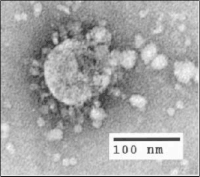
SARS-CoV-2 infection reduces human nasopharyngeal commensal microbiome with inclusion of pathobionts
Sign Up to like & getrecommendations! Published in 2021 at "Scientific Reports"
DOI: 10.1038/s41598-021-03245-4
Abstract: The microbiota of the nasopharyngeal tract (NT) play a role in host immunity against respiratory infectious diseases. However, scant information is available on interactions of SARS-CoV-2 with the nasopharyngeal microbiome. This study characterizes the effects… read more here.
Keywords: cov infection; bacterial species; sars cov; covid ... See more keywords

Trans-vaccenic acid inhibits proliferation and induces apoptosis of human nasopharyngeal carcinoma cells via a mitochondrial-mediated apoptosis pathway
Sign Up to like & getrecommendations! Published in 2019 at "Lipids in Health and Disease"
DOI: 10.1186/s12944-019-0993-8
Abstract: BackgroundIntake of trans fatty acids (TFAs) from partially hydrogenated vegetable oil is associated with a variety of adverse outcomes, but little is known about the health effects of ruminant trans fats. Trans-vaccenic acid (TVA) is… read more here.
Keywords: vaccenic acid; trans vaccenic; proliferation; human nasopharyngeal ... See more keywords

Caspase 12 degrades IκBα protein and enhances MMP-9 expression in human nasopharyngeal carcinoma cell invasion
Sign Up to like & getrecommendations! Published in 2017 at "Oncotarget"
DOI: 10.18632/oncotarget.16535
Abstract: Caspase-12 (Casp12), an inflammatory caspase, functions as a dominant-negative regulator of inflammatory responses and is associated with the signaling of apoptosis. However, the physiological function of Casp12 presented in cancer cells is still unclear. This… read more here.
Keywords: caspase; invasion; casp12; cell invasion ... See more keywords